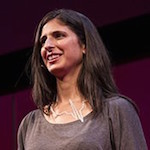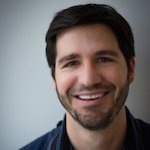In a startup cheap may be expensive.
And just having cool technology doesn't make a successful business.
What it was like to get out of the research lab to build a startup was the focus of interviews with two of the latest guests on Entrepreneurs are Everywhere, my radio show on SiriusXM Channel 111 (airing weekly Thursdays at 1 pm Pacific, 4 pm Eastern).
The show follows the journeys of founders who share what it takes to build a startup - from restaurants to rocket scientists, to online gifts to online groceries and more. The program examines the DNA of entrepreneurs: what makes them tick, how they came up with their ideas; and explores the habits that make them successful, and the highs and lows that pushed them forward.
- Nina Tandon, CEO and co-founder of EpiBone, the world's first company growing bones for skeletal reconstruction
- Brandon McNaughton, co-founder and CEO of Akadeum Life Sciences cell sorting technology company
Listen to the full interviews with Nina and Brandon by downloading them from SoundCloud here and here.
(And download any of the past shows here.)
Clips from their interview are below
In addition to her work with EpiBone, Nina Tandon is the co-author of Super Cells: Building with Biology. She is an Adjunct Professor of Electrical Engineering at the Cooper Union. Nina has a bachelor's in Electrical Engineering from the Cooper Union, a master's in Bioelectrical Engineering from MIT, a PhD in Biomedical Engineering, and an MBA from Columbia University. Her PhD research studied electrical signaling in cardiac, skin, bone, and neural tissue. Fast Company named Nina one of the 100 Most Creative People in Business.
While building EpiBone, she quickly learned to avoid business shortcuts:
Nina: Cheap is expensive.
Steve: What does that mean?
Nina: I don't think there's any corners that can be cut. Sometimes if someone offers you free services ..., it can be tempting to take them up on that offer, but then you might create a problem that's a lot more expensive to unwind down the road.
Steve: Because you're committed to the wrong people, the wrong service or whatever?
Nina: (Nods.) I've made some mistakes that are inadvertent but that needed to be undone.
To hear the clip, click here.
A tech entrepreneur and inventor, Brandon McNaughton was entrepreneur in residence for Detroit Innovate, an early-stage venture fund. He also founded and served as chief technology officer of Life Magnetics. Brandon teaches entrepreneurship at the University of Michigan Center for Entrepreneurship.
Brandon's current startup, Akadeum, was one of the 760 teams to go through the National Science Foundation (NSF) Innovation Corps, which teaches scientists and engineers how to take their science out of the lab and into the marketplace.
Brandon's biggest takeaway from the NSF program had nothing to do with technology:
I've learned that business is about relationships. Relationships with customers, it's relationships with your employees, your investors, because when you buy something, there's an expectation, there's a back and forth.
That's something that I didn't really appreciate until after my first startup. I thought it was all about the technology, "Oh, if I could just get this technology to work. If I could just get it to do this, then everything's going to be OK," and in some ways I now think technology doesn't matter. ... what matters more is the ... the customer's problem.
... I think the epiphany was when we closed down Life Magnetics ...It was hard to find that right product-market fit. The technology was working, but finding that market fit was challenging. ...
...We couldn't figure out the right business model to move forward with. That's actually how I look at startups now. It's trying to find that business model as quickly as you can that will support a company. You don't need new gee-whiz technology to do that. What you need is to understand the problem to know what do deliver to the customer.
To hear the clip, click here.
Getting to know customers, Brandon said, only happens if you get out of the lab and talk to them:
Brandon: (The I-Corps program) was a combination of being an accelerant, but also getting us (the founders) on the same page, because we all had ... different mental images and ... different expectations ...
Steve: Of what a customer was and what commercialization was?
Brandon: (Nods.) And whether or not we wanted to start a company, when we were going to start a company, and what the company would look like.
The I-Corps process was great. It was exciting to see Gwangseong Kim, (my grad student and member of the Akadeum founding team) up in front of the class because as the entrepreneurial lead he was the one who got up there and presented what we learned. (co-founder) John Younger and I just stood there ... I mean, we also did the work, too, talking to customers, things like that. But the entrepreneurial lead is the one who gets to represent the team.
... It was so amazing to watch the transformation in him. And for Gwangseong one great moment was (when) he did his first cold (customer) call. When we were in Berkeley, we were talking about cold calling and how to do it. (And Gwangseong) was a little bit of apprehension...
Steve: Because he's a scientist?
Brandon: Exactly. I still have that even when I talk to certain people, it's like, "Oh, I'm bothering somebody ..."
(But) Gwangseong made the call and within 15 minutes he gets invited to lunch the next day. Right? So he hit a nerve with a potential customer and was incredibly excited that you could make a call and get that kind of response.
...this (lunch meeting) was the kind of thing you dream about (when you're starting a company). You want to find those moments of opportunity and you don't know unless you make the call, you don't know unless you go.
To hear the clip, click here.
--
Nina shared what it was like to get out of comfort zone of the lab:
As a scientist you think that you're confident about uncertainty because you're operating in the uncertainty of knowledge, and yet you have the crutch of the scientific method constantly at your side saying, "Hypothesis, test, conclusion, reevaluate."
But to take that to the jungle in the real world (outside the lab) is a totally different level of uncertainty. (And to add even more uncertainly) throw in having to make a payroll, wanting to make sure you take care of people, knowing that people's lives and livelihoods depend on my ability to make sure there's enough money in the bank.
Now that's operating in uncertainty.
To hear the clip, click here.
There was a moment when the startup became real for her and her team:
Nina: We had a lot of conversations with people and having talked about ideas, and all of a sudden there were things that were manifesting in real time, in front of us, that gave us the sense of, this isn't a joke. This is real.
Steve: We're going to have to actually build something?
Nina: Yeah, it became concrete.
...We were hiring our first employee ... we didn't have a lot of (money in the bank), we only had one grant $350,000 at the moment. We said, "Well, we're going to hire our first employee, and you know what? We'll pay him before we pay ourselves." That was a moment where we realized, OK, we're setting a precedent here. We want to take care of our employees and we're willing to sacrifice our own salaries in order to do that. Luckily we only ended up hiring him two weeks before we hired ourselves, but we joke that he's the most senior employee.
To hear the clip, click here.
Nina also shared the best advice she's received:
My mom says that people often don't remember what you're saying, they remember how you made them feel, and be really careful not to try and use other people as a stage from which you can display your own intelligence. ...
My dad who retired at 55 told me, when I was thinking about my career ... "You can't be afraid to jump off the merry-go-round," because he's seen people who've built elaborate cages for themselves as their desires ... changed along with their economic potential, and then there was no going back.
And my third (piece of advice) is from Steve Blank. ... I don't know if you remember you told me this, but when I called you after getting a really important investor on board ... you said, "Nina, don't you dare confuse money with scientific validation, don't you dare."
To hear the clip, click here.
--
Brandon explained how Akadeum determined if their cell-sorting technology could be a business:
Brandon: ... The first thing we wanted to find out was is there a need for our product.
Steve: You woke up and said, "Who needs cell sorting?"
Brandon: That's right. We started reading the literature,... trade magazines ... scientific publications. What we'd see is sometimes people would be quoted as thought leaders and (we'd) write down their names (and) reach out to them.
Steve: What would you say? "I'm a scientist in the University of Michigan. I want to talk to you"?
Brandon: Yeah. We would say, "we're looking at developing a new technology. We just need 5 or 10 minutes of your time. We're trying to figure out if this needed or not." ...
Steve: They would respond?
Brandon: Yeah. They would respond. ... in our experience, people are very nice. People are very generous (with their time.) If you're genuine, and honest, people, they'll spend time with you. They'll help you. Really, they were helping us figure out if there was a need for this or not.
... The first thing they would do is share a little bit about whether they thought this was a good idea. Sometimes, they would say, "We have a problem that we're trying to solve that this might be a good fit. ..."
To hear the clip, click here.
Listen to my full interviews with Nina and Brandon by downloading them from SoundCloud here and here. (And download any of the past shows here.)
Next on Entrepreneurs are Everywhere: Nigel and Vaugn Caldon, co-founders of BallStar and Kerry Frank, founder of Comply365.
Tune in Thursday at 1 pm PT, 4 pm ET on Sirius XM Channel 111.
Want to be a guest on the show? Entrepreneurship stretches from Main Street to Silicon Valley, from startups to big companies. Send an email to terri@kandsranch.com describing your entrepreneurial journey.
Steve Blank's blog: www.steveblank.com


